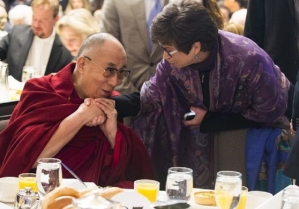
The government in China has slammed the Dalai Lama's presence at the National Prayer Breakfast, which was attended by U.S. President Obama, saying the U.S. interfered in the Communist country's internal politics by exploiting the Tibet issue.
On Thursday, President Obama issued a warm welcome to the Buddhist religious leader before launching into a speech focusing on the importance of religious freedom.
"I want to offer a special welcome to a good friend, His Holiness the Dalai Lama -- who is a powerful example of what it means to practice compassion, who inspires us to speak up for the freedom and dignity of all human beings," he told attendees. " I've been pleased to welcome him to the White House on many occasions, and we're grateful that he's able to join us here today."
Although the President did not meet directly with the Dalai Lama, China said on Friday that it was opposed to any foreign countries welcoming him as a guest.
"We oppose any other country's decision to allow Dalai to visit, and we oppose any country's interference in China's internal politics by exploiting the Tibet issue," Foreign Ministry spokesman Hong Lei said at a regularly scheduled news conference, reports Al Jazeera.
"We have repeatedly pointed out that the Tibet issue concerns China's core interest and national feelings. We oppose any other country's decision to provide platforms for Dalai's visit, and we oppose any foreign leaders' meeting with Dalai," Hong said.
Prior to the breakfast, China's official Xinhua News Agency also warned that "any possible meeting or encounter between the two is sure to have negative consequences."
"Chumming with a secessionist is playing with fire, which severely harms the mutual trust between China and the United States, and downgrades Obama's credit as a national leader for breaking his commitments to China on the Tibet issue," Xinhua writer Tian Dongdong wrote, according to Fox News.
Although the President and religious leader have met in private three times, the White House has barred media from these meetings in an attempt to minimize publicity out of respect for the Chinese government.
According to Reuters, Beijing calls the Dalai Lama, who fled to India after a failed uprising in 1959, a "wolf in sheep's clothing" who seeks to use violent methods to establish an independent Tibet. Chinese officials also routinely refer to him merely as "Dalai" as a way of negating his religious legitimacy.
Following the last meeting between Obama and the Dalai Lama in February 2014, Chinese Vice Foreign Minister Zhang Yesui summoned a U.S. diplomat to register his nation's objections. "The Tibetan issue is the domestic affair of China, and the United States bears no right to interfere," he said, according to the Xinhua news agency. "Such a move will gravely sabotage China-US co-operation and relations, and will definitely undermine its own interests".







